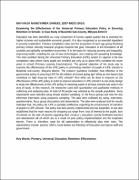| dc.description.abstract | MAYANJA NAMUYIMBA SAMUEL (2007-M023-10014)
Examining the Effectiveness of the Universal Primary Education Policy in Ensuring Retention in Schools: A Case Study of Busiimbi Sub-County, Mityana District
Education has been identified as a key component of human capital quality that is essential for higher incomes and sustainable economic growth. It is also recognised as an essential ingredient in poverty eradication. Primary completion rates and the proportion of each age group finishing primary school, directly measures progress towards this goal. Education is the foundation of all societies and globally competitive economies. It is the basis for reducing poverty and inequality, improving health, enabling the use of new technologies, and creating and spreading knowledge. The main problem facing the Universal Primary Education (UPE) system in Uganda is the low completion rates where many pupils are enrolled and only up to about 55% complete the seven years in school (Primary Leaving Examinations). The general objective of the study was to examine the effectiveness of the UPE policy in promoting retention of pupils in UPE schools in Busiimbi sub-county, Mityana district. The research questions included: how effective is the government policy in ensuring UPE for all children of school-going age? What are the factors that contribute to high drop-out rates in UPE schools? And what can be done to improve on the effectiveness of the UPE policy in order to improve education in UPE schools? A case study design to study the effectiveness of the UPE policy in retaining pupils in primary schools was used in the area of study. In this research, the researcher used both quantitative and qualitative methods in collecting and analysing data. A total of 90 people was selected as the sample population. Sixty respondents were selected using simple random sampling, 21 for focus groups and nine for key informant interviews using purposive sampling. The data were collected by using; interviews, questionnaires, focus group discussions and observations. The data were analysed and the results indicated that, the policy for UPE is partially ineffective regarding the enhancement of retention of pupils in UPE schools. The policy has been poorly implemented and has loopholes. It was also established that the main reasons for dropping out range from: loss of interest by the pupils, lack of interest on the side of parents regarding their children’s education, poorly facilitated teachers and absenteeism all of which are as a result of poor policy implementation and the loopholes therein. There is, therefore, need for all stakeholders to effectively play their roles. The stakeholders include: parents, SMCs, local leaders and Ministry of Education and Sports staff and government.
Key Words: Primary, Universal, Education, Retention, Effectiveness | en_US |


